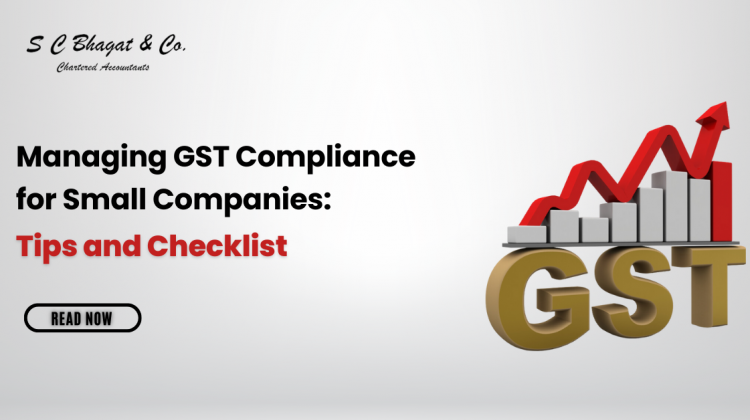In today’s fast-paced business environment, it’s crucial to managing GST compliance for small companies to manage their Goods and Services Tax (GST) compliance efficiently. This article will provide you with valuable insights, tips, and a checklist to navigate the complexities of GST compliance successfully.
What is GST?
Goods and Services Tax, commonly known as GST, is an indirect tax levied on the supply of goods and services in India. It has replaced several other taxes like VAT, excise duty, and service tax, streamlining the taxation system.
Understanding GST Categories
GST is categorized into three main types:
SGST (State Goods and Services Tax): Levied by the state government.
CGST (Central Goods and Services Tax): Imposed by the central government.
IGST (Integrated Goods and Services Tax): Applicable to inter-state transactions.
What is GST Return?
A GST return is a document that contains details of income, expenses, tax collected, and tax paid by a registered taxpayer. It is essential for businesses to file accurate GST returns to maintain compliance.
Types of GST Returns
GSTR-1: Outward supplies return.
GSTR-3B: Summary return.
GSTR-9: Annual return.
What is GST Compliance?
GST compliance refers to adhering to all the rules and regulations set forth by the government regarding the filing of GST returns, payment of taxes, and record-keeping. Non-compliance can result in penalties and legal consequences.
What is the Checklist of GST Compliance for Taxpayers?
To ensure GST compliance, small businesses should follow this comprehensive checklist:
- Registration
Register for GST if your annual turnover exceeds the prescribed threshold.
Verify the accuracy of your registration details.
- Timely Filing of Returns
File GST returns on time to avoid penalties.
Maintain proper records of invoices and transactions.
- Input Tax Credit (ITC)
Claim ITC only on eligible purchases.
Reconcile ITC with supplier invoices.
- Invoice Details
Ensure that invoices contain all mandatory information.
Match the invoice details with your purchases and sales.
- HSN (Harmonized System of Nomenclature) and SAC (Service Accounting Code) Codes
Assign the correct HSN and SAC codes to your goods and services.
Use these codes while filing returns.
- Reverse Charge Mechanism
Understand when the reverse charge mechanism applies.
Pay taxes under reverse charge when required.
- E-Way Bills
Generate E-Way bills for the movement of goods.
Ensure accuracy in E-Way bill details.
- Reconciliation
Regularly reconcile your books of accounts with GST returns.
Identify and rectify discrepancies promptly.
- Annual Return
File the annual return (GSTR-9) within the due date.
Verify the correctness of the annual return data.
What are the Challenges faced by small businesses in ensuring GST compliance?
Small companies often encounter several challenges when it comes to ensuring GST compliance:
- Lack of Awareness
Many small business owners are not well-versed in GST regulations.
They may struggle to understand the various GST return forms and procedures.
- Complex Procedures
GST compliance involves complex processes and documentation.
Small companies may find it overwhelming to navigate these procedures.
- Technological Hurdles
Filing GST returns online requires access to technology.
Some small businesses may lack the necessary infrastructure.
- Resource Constraints
Small companies often have limited resources and manpower.
This can make it challenging to manage GST compliance effectively.
How should small companies manage GST compliance?
Managing GST compliance for small companies can be made more manageable with the following tips:
- Stay Informed
Invest time in understanding GST regulations.
Stay updated with the latest changes through official government sources.
- Seek Professional Assistance
Consider hiring a GST consultant or expert.
They can provide guidance and ensure accurate compliance.
- Utilize Technology
Use GST-compliant accounting software.
It simplifies the process of filing returns and maintaining records.
- Training and Education
Provide training to your employees on GST compliance.
Ensure that your team is well-equipped to handle GST-related tasks.
- Regular Audit
Conduct periodic internal audits of your GST compliance.
Address any discrepancies promptly.
In conclusion, managing GST compliance is essential for the smooth operation of small companies. By understanding the basics of GST, following the compliance checklist, and addressing common challenges, small businesses can navigate the complex tax landscape effectively.
FAQs
- Is GST applicable to all businesses?
GST is applicable to most businesses, but small companies with annual turnovers below the threshold may be exempt.
- Can I claim input tax credit on all my purchases?
Input tax credit can be claimed only on eligible purchases that are used for business purposes.
- What are the penalties for non-compliance with GST regulations?
Penalties for non-compliance can include fines and legal actions. It’s crucial to file returns accurately and on time.
- Is GST compliance the same for all states in India?
While the basic GST rules are uniform across India, there may be some variations in state-specific requirements.
- How can I rectify errors in my GST returns?
Errors in GST returns can be rectified by filing an amendment return with the correct information. It’s essential to do this promptly to avoid penalties.
Remember that proper GST compliance not only ensures legal adherence but also contributes to the growth and sustainability of your small business.
If you have any questions or wish to know more about “Managing GST Compliance for Small Companies: Tips and Checklist”, kindly Contact us.

